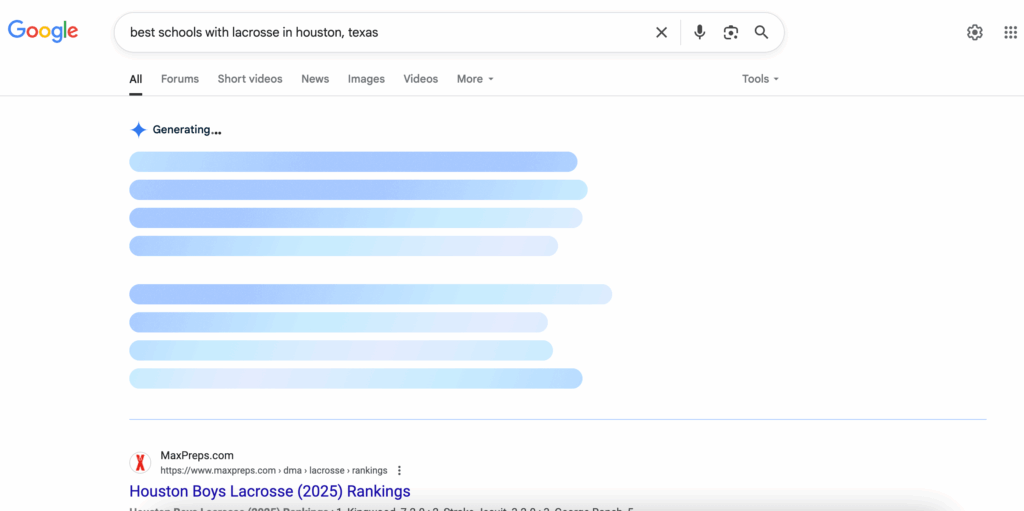By Maggie Twaroski, Truth Tree Contributor
Ever since the AI-generated snippet entered the SERP stage, 60 percent of Google searches end without a click. For private schools, getting your website in front of prospective families—whether it’s in the top three organic searches or the featured snippet—requires a little extra SEO prowess.
Traditional SEO best practices are still necessary for maintaining SERP rankings–quality content, mobile optimization, keyword research, internal links–you know the drill. But there’s another factor becoming increasingly important to your independent school’s SEO strategy as zero-click searches grow. What’s the secret?
Topical Authority.
This is the result of a website that demonstrates strong experience, expertise, authority, and trustworthiness (E-E-A-T) in a particular niche. It’s a sign of your website’s content quality and “rankability.
Why topical authority matters for a private, independent school’s SEO strategy
Competing for the top organic search result used to be the number one goal for school websites, but times have changed. Now, the best digital real estate is in one of those no-click spots that users love, whether it’s position zero or a SGE snippet. These featured spots are the first thing users see, so getting your content there can be a huge boost to your brand awareness and website traffic. Although users don’t necessarily have to click on your page to get their query answered, these featured snippets do entice users to click for more information.

So, where does topical authority come in? Simply, websites with established topical authority are more likely to make it into one of these spots. They’re also more likely to achieve higher organic rankings, even against websites with better SEO metrics. If you already have a solid SEO strategy in place for your independent school, you’re well on your way to building the topical authority needed for top rankings.
Topical authority vs. domain authority
You may have heard these terms used interchangeably, but they’re slightly different. Domain authority refers to the overall trustworthiness of your school’s brand. It’s determined largely by backlinks, the age of your domain, and how many indexed pages and branded searches you have. Topical authority, on the other hand, refers to your school’s expertise on a particular topic. Private schools are automatically well-positioned to build topical authority, since they typically fall within a particular niche (Christian, language immersion, special education, boarding, etc.).
Topical authority naturally leads to domain authority over time, as your pages gain visibility and higher rankings. Start by focusing on building your topical authority through a solid content strategy, then watch your domain authority gradually improve.
5 ways private, independent schools can build topical authority
When ranking pages based on topical authority, search engines are looking for valuable content that adheres to SEO standards and that is relevant to your audience’s searches. They’re also looking at your website traffic, thought leadership content, reviews, and backlinks. Let’s unpack each of these in detail, so you’ll have the knowledge and tips you need to improve your topical authority and rankings.
Keyword research
In order to improve your topical authority, you need to make sure you’re covering all the topics your prospects care about. Start by conducting thorough keyword research to learn which questions your audience is asking and what topics they’re searching for most often. For example, a Catholic school might find its keywords center mostly around tuition, religious requirements, and public school comparisons. Don’t assume you know what your audience is searching for–take the time to do your keyword research!
Testimonials
If you haven’t launched a review campaign yet this year, now is the time. Search engines use reviews as a basis for determining topical authority, so the more positive reviews you have, the better. Simply ask parents to submit a review on your school’s Google page, or send them a quick, easy online form.
Social media engagement
Although social media doesn’t directly impact your topical authority, it can increase the number of visitors to your web pages, which does improve topical authority. Start by posting consistently on your top one or two social media platforms (Facebook and Instagram, for example). Respond to comments and share user-generated content to increase your visibility and ultimately lead more prospects back to your website.
Valuable content
Every piece of content you create should pose value to its reader. The more value you offer, the more likely search engines are to recognize your topical authority and rank your pages accordingly. Focus on sharing original insights with your audience, and incorporate practical tips, educational statistics, or quotes from subject matter experts. The key in distinguishing high-quality content from mediocre content is detail and originality. Be as specific and detailed as you can in each of your topics, while also presenting your own insights.
Backlinks
Last but definitely not least, quality backlinks are key in determining your site’s topical authority. Backlinks occur when other sites link to one of your web pages (like a blog post). Backlinks signal to search engines that your site is a source of authority. The more you have, the more likely you are to be featured in no-click snippets. That said, you don’t want just any backlinks; you want them to come from other reputable sites. In other words, quality is better than quantity. If you’re new to link building, start by creating some linkable assets or offering to write some guest posts for trusted education blogs.
How private, independent schools can measure topical authority
Unfortunately, there’s no magical metric that tells you whether or not you’ve achieved topical authority. But there are several things to look at in your website analytics to help determine if you have some of the key markers of topical authority. Here are some things to look for:
- Ranking keywords: The more keywords your website ranks for, the greater the indication of topical authority
- Enter your website into Moz’ Domain Authority Checker. This will tell you your website’s domain authority score, spam score, and a list of ranking keywords.
- High-quality content: Demonstrate to your website visitors that you know and understand their interests, concerns, and priorities.
